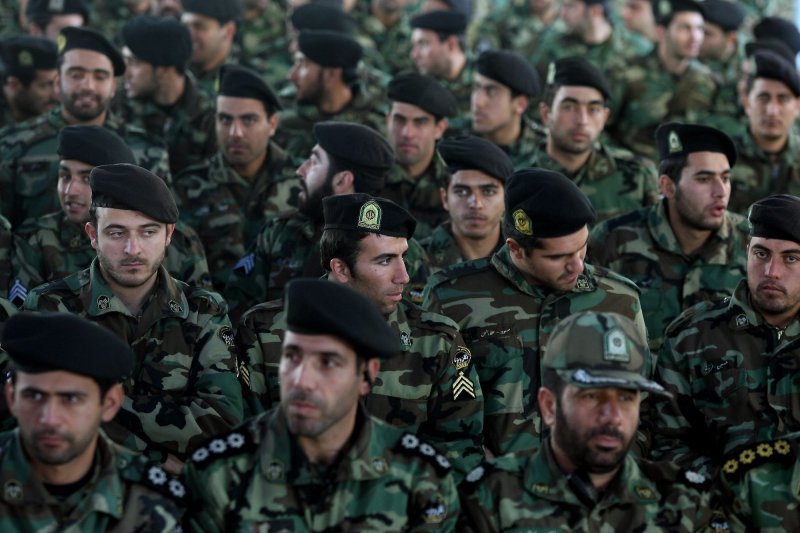1 of 5 | Members of Iran's elite Revolutionary Guards attend a celebration to mark the anniversary of Islamic revolution at the Behesht-e Zahra (Zahra's paradise) cemetery in southern Tehran, Iran on February 1, 2010. The celebration is to mark the 1979 return of Ayatollah Khomeini from exile. UPI/Maryam Rahmanian |
License Photo
DUBAI, United Arab Emirates, May 5 (UPI) -- Iran's Islamic Revolutionary Guards Corps has widened its ever-expanding economic power with a no-tender contract from the Oil Ministry to develop two big natural gas fields in southern Fars province.
Even before the April 30 award, the IRGC's engineering and construction arm, Khatam-ol-Anbia, was the largest contractor of government projects in Iran and has become a massive business conglomerate that is independent of state regulation.
"Within the Islamic Republic, and increasingly in Iran's external trade, the IRGC is an economic powerhouse," says Ali Alfoneh, an Iranian analyst working in the West.
"The Islamic Republic, once governed by the Shiite clergy and guarded by the IRGC, is developing into an economy dominated by the military."
Khatam-ol-Anbia currently has projects in the mining, telecommunications, dam-building and trading sectors as well as the oil and gas industry.
The IRGC, formed by Ayatollah Ruhollah Khomeini in May 1979 to protect the infant Islamic Republic, has become the most powerful military force in Iran.
It also dominates the arms industry, including the development and production of ballistic missiles like the Shehab-3b, and has operational control of the nation's strategic missile forces.
Khatam-ol-Anbia got a major boost last June when the United Nations, along with the United States and the European Union, imposed tight economic sanctions on Iran for its refusal to abandon its contentious nuclear program.
The Guards Corps, a major target of the sanctions because of its growing economic clout, exploited the punitive measures taken against it by assuming a major role in developing Iran's oil sector.
The Islamic Republic has oil reserves of 150 billion barrels, the third largest in the world. Its natural gas reserves are pegged at 948 trillion cubic feet, second only to Russia.
The Revolutionary Guards' engineering companies replaced Europeans driven off by sanctions and were given huge no-bids contracts, greatly enhancing its economic power.
This, when combined with the political clout the IRGC has amassed in recent years, particularly under hard-line President Mahmoud Ahmadinejad, a Guards commander in the 1980-88 war with Iraq, gives the IRGC immense power in Iran.
In June 2006, the Revolutionary Guards were put in charge of developing the giant offshore South Pars gas field in the southern Persian Gulf. South Pars is the world's largest gas field, with reserves estimated at 1,800 trillion cubic feet of gas.
The National Oil Co. of Iran awarded that contract, also without putting it out to tender, in June 2006.
At the time, several members of Parliament demanded an inquiry into how the contract was awarded. Government spokesman Gholam-Hossein Elham defended the project. No inquiry occurred, then or since.
"The IRGC now interprets its operation freedom so broadly that it accepts no constitutional restrictions," Alfoneh observed. "In effect, as long as the supreme leader supports the IRGC, any action it takes is legal."
In July 2006, Khatam-ol-Anbia expanded its influence in the oil and gas sector by assuming ownership of public enterprises that included the Oriental Kish Co., a drilling outfit sometimes known as Oriental Oil.
"IRGC involvement changed Oriental Kish operations," Alfoneh noted in a recent paper. It "resolved a commercial dispute with the Romanian-owned Grup Servicii Petroliere by firing on Romanian workers from both military helicopters and ships before boarding the (offshore) Romanian rig and holding its crew hostage."
The Revolutionary Guards also muscled its way into the telecommunications business.
In February 2002, the IRGC-operated Iran Electronic Industries forced the government to cancel a second mobile phone network set up by a Turkish company, Turkcell, which the government had approved.
Alleging that letting the Turks in would compromise national security, the Guards took over the contract themselves.
In September 2009, the IRGC-linked Etemad-e-Mobin consortium bought a majority share in the state-run Iranian Telecommunications Co. for $7.8 billion. That brought the strategic sector under the Revolutionary Guards' control.
They have also moved heavily into Iran's underground economy.
Mehdi Karroubi, a former parliamentary speaker who heads the so-called Green opposition movement, alleges the IRGC operates 60 "invisible jetties" along the south coast for illegal import and export activities.
Critics claim that one-third of Iran's imports enter the country illegally, usually courtesy of the IRGC. One lawmaker estimated the IRGC made around $12 billion a year from smuggling.















